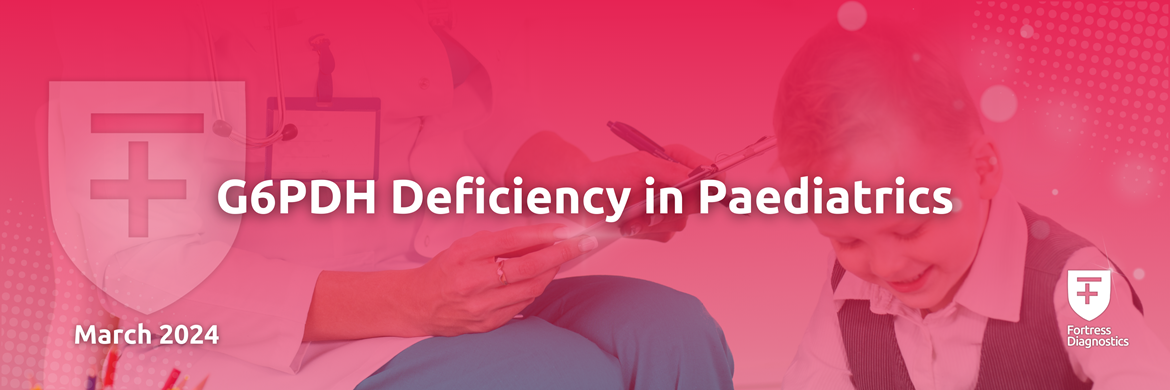
01 February, 2024
One of the most common enzyme deficiencies in the world is glucose-6-phosphate dehydrogenase (G6PDH), an x-linked recessive disorder. G6PDH deficiency affects more than 400m globally. It is most prevalent in tropical and sub-tropical (malaria-endemic) countries, including Africa, Middle East, and South Asia 1, 2.
Aetiology of G6PDH
The Gd gene is located on the long arm of the X chromosome and is responsible for coding the G6PDH enzyme. The G6PDH enzyme is found in the cytoplasm of cells and is responsible for the normal processing of carbohydrates. It plays a vital role in erythrocytes, preventing them from damage and premature destruction. G6PDH deficiency is the result of mutations to the protein structure, thus, reducing its activity, or the amount of the enzyme produced 3.
G6PDH is responsible for the first step in the pentose phosphate pathway (PPP), an alternative branch of glycolysis responsible for the conversion of glucose to ribose-5-phosphate (R5P). R5P is a vital component of nucleotides, building blocks of nucleic acids (DNA and RNA). This chemical reaction produces the by-product NADPH, an important molecule involved in the protection of cells from reactive oxygen species (ROS). The production of NADPH by G6PDH is vital in erythrocytes as red blood cells (RBCs) are particularly susceptible to oxidative stress by ROS due to their involvement in oxygen transport as they lack other NADPH-producing enzymes 3.
Pathophysiology of G6PDH
The G6PD gene has been identified as having more than 200 variants (mutations) that result in G6PDH deficiency. Almost all of these variants cause changes in the amino acids in the G6PDH enzyme, which either disrupts the normal structure and function of the enzyme or reduces the amount the G6PDH enzyme produce in the cytoplasm of cells 3.
Decreased levels of G6PDH means that RBCs are unable to protect themselves against ROS and thus, oxidative damage, resulting in the RBCs undergoing haemolysis (premature breakdown and destruction of RBCs) 3.
Many individuals are asymptomatic most of their life until exposed to triggering factors, such as infection, certain drugs (see table 1) or ingesting certain foods (fava beans), which increases the level of ROS, causing erythrocytes to undergo haemolysis faster than the body can replace them. This loss of RBCs results in haemolytic anaemia, a key characteristic of G6PDH deficiency 4.
Table 1: Medications Which Can Trigger Haemolysis in G6PDH Deficiency 4
|
Acetaminophen
|
Methylene Blue
|
Sulfacytine
|
|
Acetylsalicylic Acid
|
Nitrofurantoin
|
Sulfadiazine
|
|
Chloramphenicol
|
Phenazopyridine
|
Sulfaguanidine
|
|
Colchicine
|
Primaquine
|
Sulfamethoxazole
|
|
Diaminodiphenyl Sulfone
|
Rasburicase
|
Sulfisoxazole
|
|
Diphenhydramine
|
Streptomycin
|
Trimethoprim
|
|
Glyburide
|
Sulfacetamide
|
Tripelennamine
|
|
Isoniazid
|
Sulfanilamide
|
Vitamin K
|
|
L-Dopa
|
Sulfapyridine
|
|
G6PDH Deficiency in Paediatrics
Neonates who are G6PDH deficient appear normal at birth, but later can experience neonatal jaundice and haemolysis, that is serious enough to cause neurological damage and/or death. Except for the severe complications in the new-born period, neonates with G6PDH deficiency generally experience normal growth and development 5.
G6PDH deficiency is a serious risk factor for the development of hyperbilirubinemia in neonates, increasing their risk 2-fold. Moreover, 20% of kernicterus (bilirubin-induced neurological damage) are associated with G6PDH deficiency. Whilst kernicterus is rare, G6PDH should be tested in neonates who develop jaundice in the first 24 hours of life, have bilirubin levels greater than the 95th percentile, or who have a history of a sibling with neonatal jaundice 4.
G6PDH Deficiency and Malaria in Paediatrics
Malaria is the leading cause of mortality in tropical and sub-tropical regions. It has been suggested that G6PDH deficiency offers protection against Malaria, however, Malaria treatment can be fatal in those who are G6PDH deficient 2, 6, 7, 8.
Glucose-6-phosphate dehydrogenase deficiency and the risk of malaria and other diseases in children in Kenya: a case-control cohort study (2015) 9
A case-control study consisting of 2,220 cases (aged younger than 14 years with severe malaria) and 3,940 controls (aged 3-12 months born within the same study area) in Kenya.
The study found that heterozygous girls for the G6PDH c.202T allelic form of G6PDH deficiency were significantly protected from severe and complicated P falciparum malaria. Conversely, G6PDH deficient children had a significantly increased risk of severe malaria anaemia.
Association of glucose-6-phosphate dehydrogenase deficiency and malaria: a systemic review and meta-analysis (2017) 7
A systemic review of thirteen databases reporting any G6PDH alteration in malaria patients. Twenty-eight of the included thirty studies were eligible for the meta-analysis. The characteristics of the thirty included studies are as follows: seventeen studies with 21 datasets were on African patients, eleven studies containing 14 datasets were on Asian patients, one study on Brazilian patients and one performed in Papua New Guinea. Seven studies were case-control, one was a randomised double-blinded clinical trial and the rest were cross-sectional studies. Sixteen of the studies were performed on infants and children only, while the remaining included adults and children.
The study concluded that G6PDH deficiency can potentially protect against uncomplicated malaria in African countries, but not severe malaria. The protection was predominantly heterozygous.
Safety of primaquine in infants with Plasmodium vivax malaria in Papua, Indonesia (2019) 10
An Indonesian retrospective, hospital-based cohort study of infants aged 1-12 months with vivax malaria between 2004 and 2013. A total of 4,078 infants (1,228 aged between 1 and 6 months and 2,453 aged between 6 and 12 months) were presented to the hospital for the first time with vivax malaria.
The study concluded that due to the potential life-threatening consequences of haemolysis from either recurrent P. vivax malaria or anti-relapse treatment in G6PDH deficient infants, G6PDH testing is vital to ensure that radical cure can be deployed safely to those who need it most.
Glucose-6-phosphate dehydrogenase deficiency and susceptibility to childhood diseases in Kilifi, Kenya 11
An African case-control study involving 6,829 children under the age of 14 admitted to the Kilifi County Hospital, with 10,179 controls recruited from the surrounding community. Cases were sub-classified based on their clinical and laboratory findings at admission.
The study concluded that although G6PDH c.202 deficiency does not correlate with a major risk of severe intravascular haemolysis, it is responsible for almost half of all neonatal jaundice cases.
G6PDH Deficiency and COVID
It has been discovered that G6PDH deficient cells are more vulnerable to the human coronavirus compare to G6PDH normal cells. G6PDH deficiency was overlooked throughout the COVID-19 pandemic. This could have been because in the regions where COVID-19 was at is highest, is where G6PDH deficiency is rare. For example, in Hubei province in China, G6PDH deficiency is only 0.098% 12.
It has been noted that G6PDH deficient patients infected with COVID-19 are more susceptible to haemolysis and thrombosis. Moreover, it has been reported that G6PDH deficiency in those with COVID-19 exacerbates the disease, and in some cases, an increase in haemolysis and thrombosis was observed when patients were treated with hydroxychloroquine as this drug has oxidative properties 13.
Conclusion
In conclusion, G6PDH deficiency is one of the most common enzyme deficiencies, affecting more than 400m people. It is predominately observed in malaria-endemic countries, and can cause life-threatening complications. Those who are G6PDH deficient, depending on the genotype, can have protective properties against malaria. However, it is vital that G6PDH is routinely tested for, especially in malaria-endemic countries before prescribing malaria medication and it can induce haemolysis. Moreover, links have been found between G6PDH deficiency and COVID-19, further highlighting the new for routine G6PDH testing.
Fortress G6PDH Solutions
Quote our promotional code ‘G6PDH24’ for a discount on G6PDH products.
References
- Isaac IZ, Mainasara AS, Erhabor O, Omojuyigbe ST, Dallatu MK, et al. Glucose-6-phosphate dehydrogenase deficiency among children attending the Emergency Paediatric Unit of Usmanu Danfodiyo University Teaching Hospital, Sokoto, Nigeria. International Journal of General Medicine 2013; 6(PMC3711754). https://www.ncbi.nlm.nih.gov/pmc/articles/PMC3711754/ (accessed 22 January 2024).
- Moorthie S. Link between G6PD deficiency and malaria. https://www.phgfoundation.org/news/link-between-g6pd-deficiency-and-malaria (accessed 22 January 2024).
- Medline Plus. G6PD gene. https://medlineplus.gov/genetics/gene/g6pd/ (accessed 22 January 2024).
- Richardson SR, O'Malley GF. Glucose-6-Phosphate Dehydrogenase Deficiency.Treasure Island: StatPearls; 2023. https://www.ncbi.nlm.nih.gov/books/NBK470315/ (accessed 22 January 2024).
- Glucose-6-phosphate dehydrogenase (G6PD) deficiency. https://rh.perkinelmer.com/disorders/g6pd-deficiency (accessed 23 January 2024).
- Peters AL, Van Noorden CJF. Glucose-6-phosphate Dehydrogenase Deficiency and Malaria: Cytochemical Detection of Heterozygous G6PD Deficiency in Women. Journal of Histochemistry and Cytochemistry 2009; 57(11). https://www.ncbi.nlm.nih.gov/pmc/articles/PMC2762880 (accessed 23 January 2024).
- Mbanefo EC, Ahmed AM, Titouna A, Elmaraezy A, Trang NTH, et al. Association of glucose-6-phosphate dehydrogenase deficiency and malaria: a systematic review and meta-analysis. Scientific Reports 2017; 7(45963). https://www.ncbi.nlm.nih.gov/pmc/articles/PMC5382680/ (accessed 23 January 2024).
- Vivax Information Hub. G6PD deficiency. https://www.vivaxmalaria.org/diagnosis-treatment/g6pd-deficiency (accessed 23 January 2024).
- Uyoga S, Ndila CM, Macharia AW, Nyutu G, Shah S, et al. Glucose-6-phosphate dehydrogenase deficiency and the risk of malaria and other diseases in children in Kenya: a case-control and a cohort study. The Lancet Haematology 2015; 2(10). https://www.ncbi.nlm.nih.gov/pmc/articles/PMC4703047 (accessed 23 January 2024).
- Setyadi A, Arguni E, Kenangalem E, Hasanuddin A, Lampah DA, et al. Safety of primaquine in infants with Plasmodium vivax malaria in Papua, Indonesia. Malaria Journal 2019; 18(111). https://malariajournal.biomedcentral.com/articles/10.1186/s12936-019-2745-7 (accessed 23 January 2024).
- Uyoga S, Macharia AW, Ndila CM, Nyutu G, Shebe M, et al. Glucose-6-phosphate dehydrogenase deficiency and susceptibility to childhood diseases in Kilifi, Kenya. Blood Advances 2020; 4(23). https://www.sciencedirect.com/science/article/pii/S2473952920320206 (accessed 23 January 2024).
- Al-Abdi S. G6PD deficiency in the COVID-19 pandemic: Ghost within Ghost. Hematology/Oncology and Stem Cell Therapy 2021; 14(1). https://www.ncbi.nlm.nih.gov/pmc/articles/PMC7166036/ (accessed 23 January 2024).
- Hernández-Ochoa B, Ortega-Cuellar D, González-Valdez A, Cárdenas-Rodríguez N, Cárdenas-Rodríguez N, et al. COVID-19 in G6PD-deficient Patients, Oxidative Stress, and Neuropathology. Current Topics in Medicinal Chemistry 2022; 22(16). https://pubmed.ncbi.nlm.nih.gov/35578850/ (accessed 23 January 2024).








